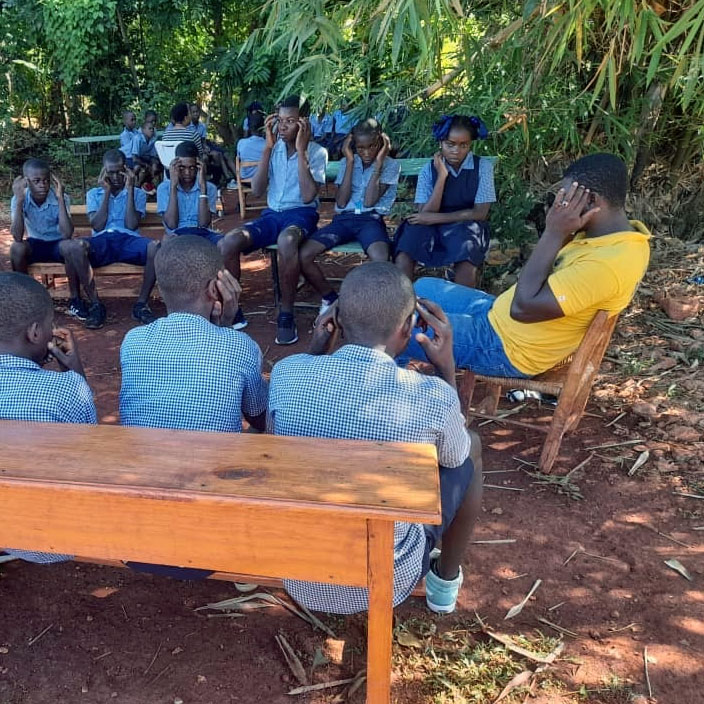Stories of Change

A facilitator leads a group of students through an exercise as part of the mental health sessions at the public school of Cassavon.
In Haiti, Mental Health is Important in Earthquake Recovery
Students at the public school of Cassavon in Haiti’s Pestel municipality have been through a lot in the last few years. We first got to know this community following Hurricane Matthew five years ago. Cassavon was one of the public schools that CWS helped rebuild after the storm. We also helped build homes for local families whose houses had been badly damaged or destroyed. Then, in the last couple of years, Haiti has plunged deeper and deeper into political unrest and economic turmoil. The COVID-19 pandemic has not spared Haiti, either, and the economic fallout of closed borders and shutdowns has been devastating.
On the morning of Saturday, August 14, 2021, another disaster struck. A 7.2-magnitude earthquake shook Haiti, its epicenter not far from Pestel. More than 2,200 people died. Thousands were injured. Fields that had been ready for harvest were destroyed. Buildings collapsed.
We are proud to say that the public school of Cassavon stood strong through the quake, as did all of the houses that CWS helped families build. That’s about the extent of the good news, though. Families in Pestel are once again struggling to cope. Our initial surveys showed that there are huge needs for necessities like shelter and water. The CWS family is responding, and you can learn more about that here.
For now, though, let’s focus on the students at the public school of Cassavon. This earthquake was the latest in a series of traumatic events that they were trying to process. Within a few weeks, it was clear that their young minds and bodies were struggling under the weight of deep stress and anxiety. Mental health had to be a priority alongside the other elements of our relief effort.
In October, we organized two sessions for the students at Cassavon. A total of 139 children participated in a two-part program. It was split into two three-hour sessions on back-to-back Fridays. The objective was to help students find the words to talk about their mental health and then to offer activities and outlets to help them feel calmer and more hopeful.
The lessons varied based on the students’ ages, but they followed a basic pattern. In group sessions, students learned the words for lots of different emotions that they could use to describe how they were feeling. They learned about how there are variations and mixtures for emotions, and they might even be feeling something that we don’t have words for yet. They did deep breathing exercises and learned about basic meditation and mindful listening. They talked about things that they felt hopeful about. They also danced and did exercises like jumping rope or stretching. All of these are things that they could do again on their own or show to their families to do at home, too.
Students ranked how they were feeling before and after the sessions, and we saw a dramatic rise from start to finish. Students showed an interest in having these sessions as a regular part of their school week and said that they would continue to practice at home when they feel tense. Some students who were really struggling were identified for deeper follow up support.
Following the success of these sessions at Cassavon, we are planning similar workshops in nine other schools across Pestel. We are also holding training sessions for teachers to better understand and accompany children and for community leaders so that they can learn how to lead these sessions and hold them for other groups and prevent domestic or community violence.
After the training, the consultants told us that the best advice they would give organizations working in similar situations is that people need more than just financial or material support. They need support rebuilding their mental health and resilience, which enable people to cope on their own with the realities of life. “Organizations that support teachers and students must continue to do so, because they are the real engines of social revival,” they said.
The road to recovery from this earthquake will be a long one. As physical infrastructure and systems are rebuilt, minds and bodies will need to be healed, too. Thank you, CWS family, for bringing some hope and peace back to the students at the public school of Cassavon and to many of our other neighbors in Haiti.
——–
We are grateful for the support of the CWS family and our valued partners in the August earthquake response. We would like to thank Episcopal Relief and Development, the Evangelical Lutheran Church in America, the Church of the Brethren, the United Church of Christ, Week of Compassion and the Christian Reformed Churches in the Netherlands. Our ACT Alliance partners, alongside generous congregational, individual and foundation supporters, are also making this response possible.
